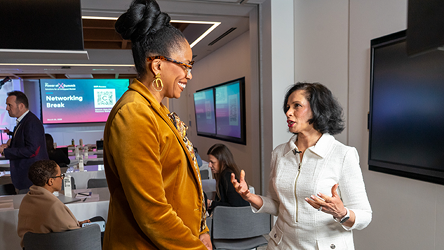July 11, 2025
Article
6 Tips to Maximize Your Mentor Relationship

Overview
Strong mentorships can accelerate your entrepreneurial journey. Experts from NYCEDC, Ally Bridge Group, and Hunter College share how to communicate, build trust and get the most out of a mentor relationship.
From goal-setting to tough conversations, these tactics help healthcare entrepreneurs build lasting mentor relationships
You’ve got a mentor, someone whose experience and perspective can help you navigate the journey of building a healthcare venture and progressing your career. But securing a mentor is just a start. To get the most value from the relationship, you need intention, clarity and commitment.
The best mentor-mentee relationships are built on trust, communication and mutual commitment. You can maximize the partnership by preparing your goals and expectations, being open to feedback and respecting your mentor’s time as a valuable resource.
Whether your are starting or scaling your project, here are six tips for build and grow a productive relationship with your mentor.
1. Drive the Relationship
Most mentorships begin when the mentee asks for guidance from the mentor. From that point forward, it is the mentee’s responsibility to sustain the dialogue. Establishing a framework early on — such as agreeing on the frequency and duration of meetings — can help create a productive and mutually beneficial relationship.
"The mentee needs to check in with the mentor as they feel appropriate and drive the relationship. I genuinely enjoy hearing from my mentees. Whether it’s a professional or life update, or talking through a specific issue, I will make time," explained Paresh Kumar, PharmD, JD, a Vice President at Ally Bridge Group.
2. Learn What Your Mentor Expects
Your mentor will want to see that you are taking their guidance seriously.
"It doesn't mean you have to do everything your mentor says, but you should at least be open to it and trust that they have your best interests at heart. If something they are recommending isn't clear, ask your mentor to elaborate on the reasons behind what they are suggesting," said Arabella Pollack, distinguished lecturer in the Department of Economics at Hunter College and director of the Certificate in Business Studies program.
Both of you will need to make a commitment to the relationship.
"As a mentee, be willing to follow up on the advice you receive and report back to them about how it's going," Pollack added.
The mentor also needs to understand the commitment to being available to the mentee. "On both sides, there has to be that kind of willingness to make it work, not just check a box," she noted.
3. Don't Be Afraid to Ask About More than Work
Your mentor can share wisdom not only about how to do a job or forge a career path, but other issues you may be encountering as you move through the various stages of life.
Examples may include buying a first home, balancing career and family, or dealing with difficult personalities in the workplace. Such skills are just as important to building a career as learning the ins and outs of your job itself. Mentors may share valuable insights based on their own experiences.
"It doesn't always have to be about work. Navigating life’s changes and challenges is equally important," said Kumar. "A mentee once reached out after getting engaged to seek advice on the right time to have a family, where to live, and considerations beyond a physical home — topics that aren’t strictly work-related, but impact career decisions. I’ve done the same with my mentors."
"A mentor can impart 'soft skills' such as strengthening interpersonal skills and communicating effectively — innate skills that are often not taught, but learned," added Viq Pervaaz, Senior Vice President, Life Sciences & Healthcare at the New York City Economic Development Corporation, which runs the LifeSci NYC Internship Program to help develop careers within the city's thriving life sciences industry.
4. Know That You Already Have Some of the Answers
While the wisdom and experience of mentors may help you make important decisions about which way your career path will take you, you may already have that knowledge inside you, and your mentor can help you uncover it.
"Answers that mentees seek are often found within, based on their individual life experiences. A good mentor can help uncover those answers by asking more tailored questions that draw on their relationship with the mentee, and by offering additional insights from their own experiences," said Kumar.
5. Enjoy the Journey
Andrew Lam, PharmD, Managing Director, Head of Biotech Private Equity at Ally Bridge Group and a founder of Life Science Sherpas, has advised mentees, especially those early in their careers, not to think about their careers like a GPS with turn-by-turn directions telling them how many years they should spend in a particular job before moving on.
"Your career is more like a compass. Just know you're going in the right direction and enjoy the ride. There are twists and turns and construction ahead. Sometimes you have to take an off ramp and it may take you a lot longer than you expected. If you only focus on the destination, you won't enjoy the journey," said Lam.
6. Know When It's Not Working
Sometimes despite the best efforts of a mentee and mentor, the relationship does not thrive. Don't be afraid to take what you’ve learned and move on to find another mentor who is better suited to your needs.
"It has to be a relationship with trust and openness. If you don't feel comfortable with that person, it's not going to be a good mentor relationship because you are not going to feel comfortable sharing the areas in which you are looking for guidance," noted Pollack. "You may not necessarily be comfortable taking their guidance, and they're not necessarily going to be able to give you the right guidance. It's okay if it's not working for you to step back, or give your mentor a chance to step back if it's not working for them."
"Like any relationship, there's cognizance that things are not always rosy and happy and peachy. So how do you have productive conversations to get things back on track? One of the things a mentor can teach a mentee is that there are productive ways to have difficult discussions," said Pervaaz. "But if that doesn't go in the right direction, it's important to have the maturity to say maybe this isn't the right fit.
"One thing that could come out of a mentorship is that it didn't work," he continued. "But maybe you tried to make it work and learned that there's a point where pushing doesn't yield results, and you need to seek alternate solutions. That's a vital lesson in anyone's career journey."





